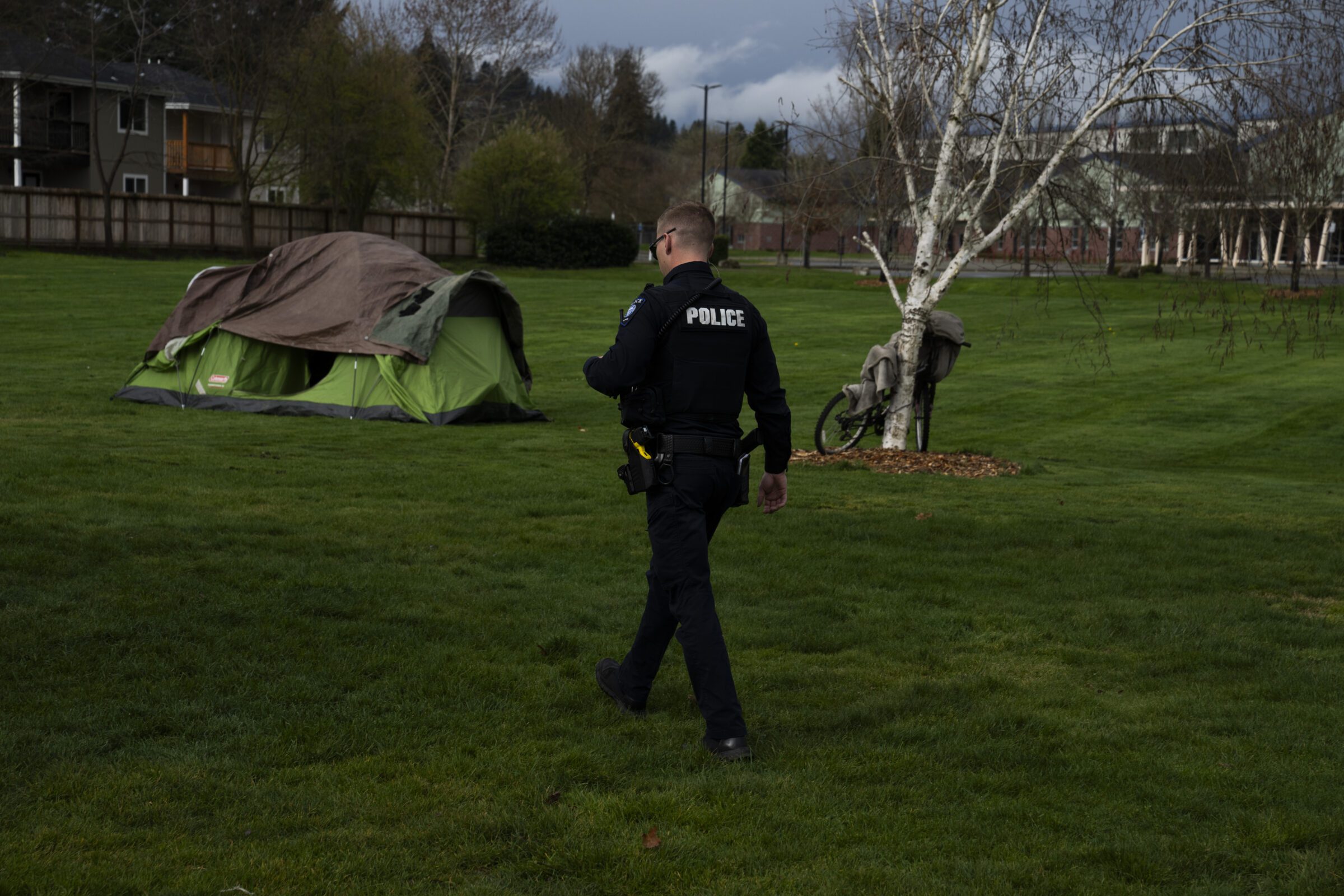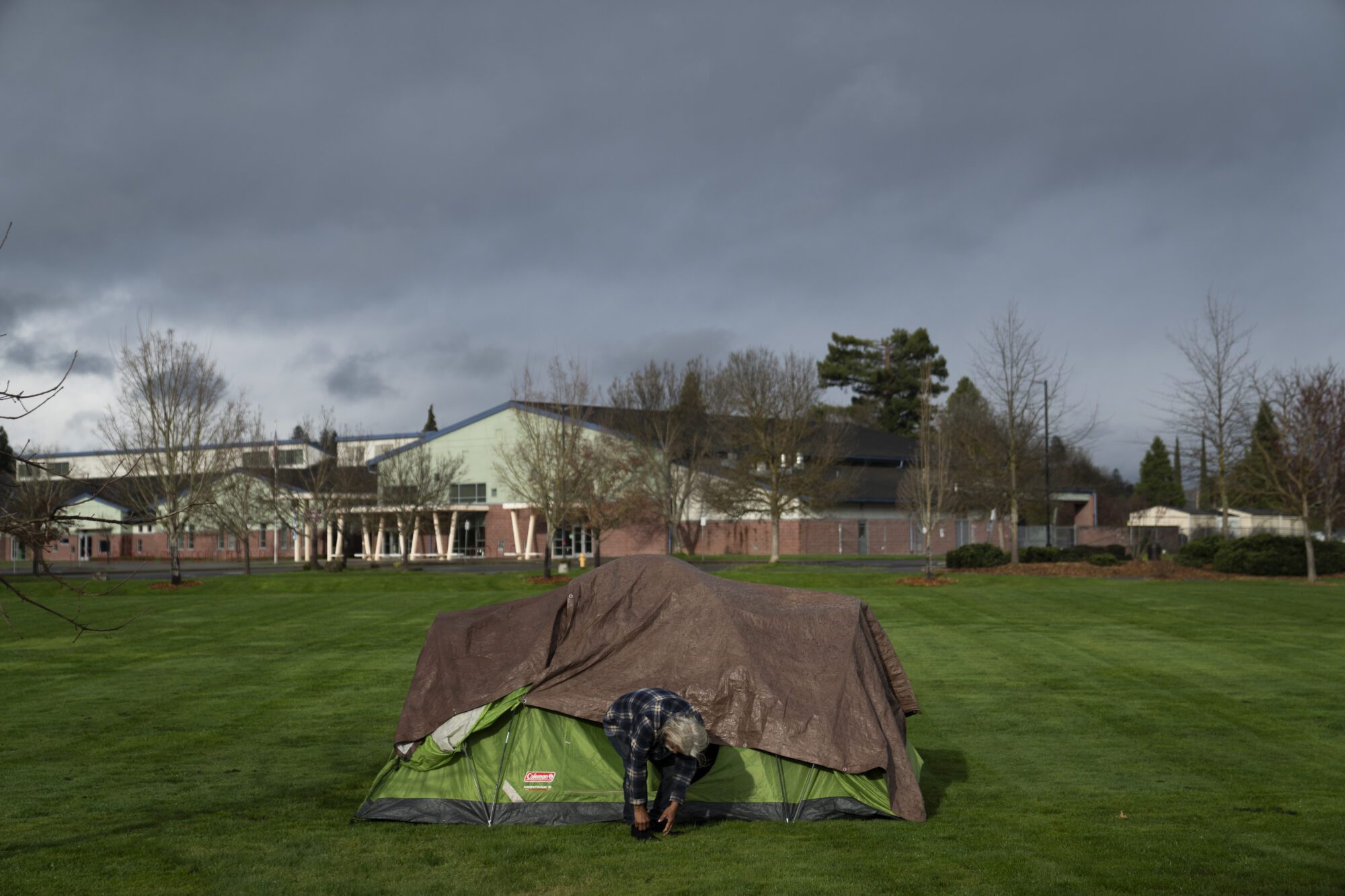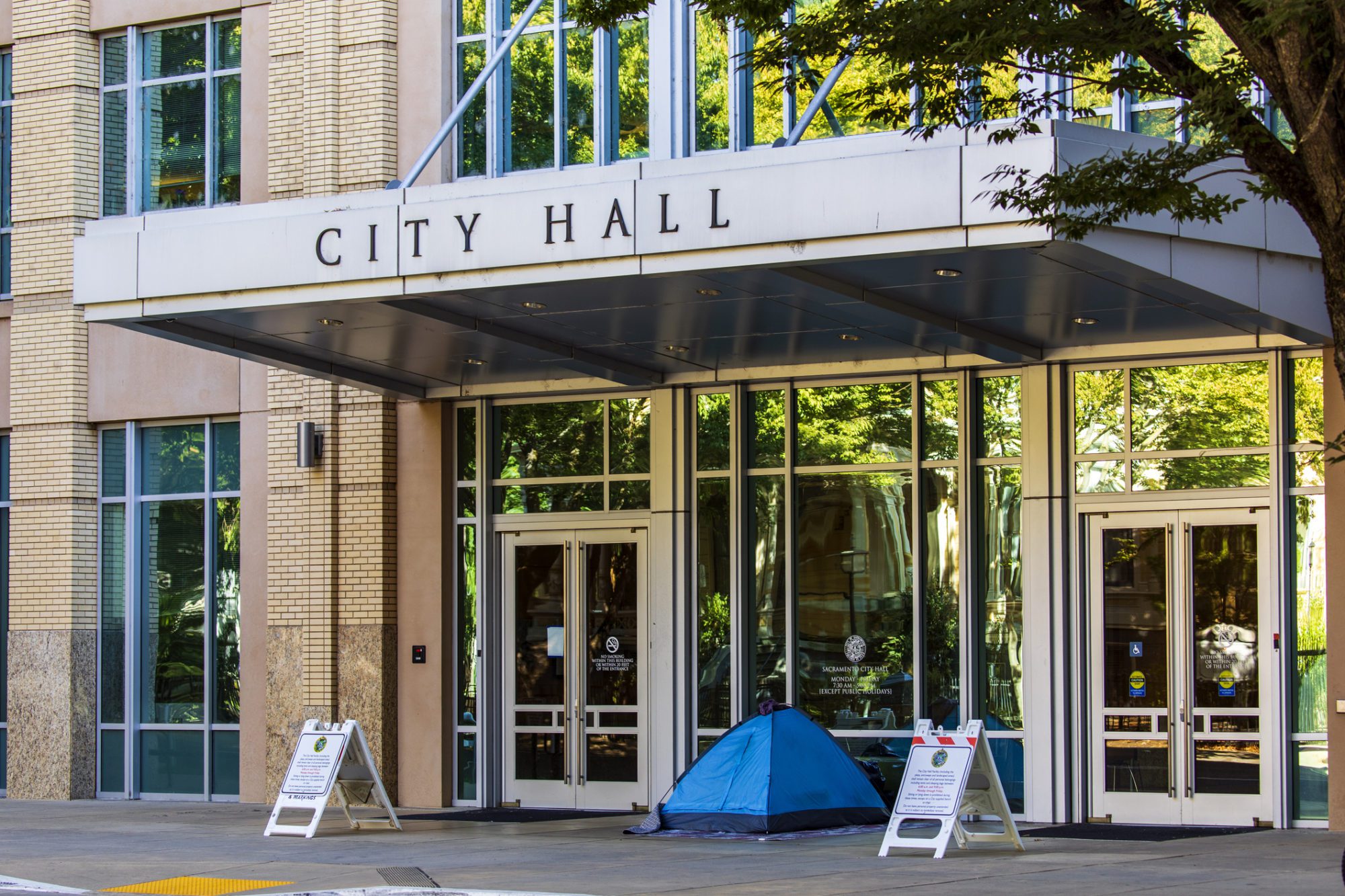This City Inspired A New National Standard for Policing Homelessness. Now It’s Cracking Down Even More.
Months after a landmark Supreme Court ruling, the Oregon city of Grants Pass elected new leaders who immediately moved to reduce campsites available to unhoused residents.
| January 24, 2025

Voters in Grants Pass, Oregon, elected a new mayor and four new city councilors with far-right politics in November. The GOP-backed bunch was sworn in on Jan. 6, 2025, and called a special meeting the following afternoon, at which it doubled down on the type of anti-homeless policies that made Grants Pass famous last year when its case was heard by the highest court in the land. In Grants Pass v. Johnson, the Supreme Court held that citing or jailing unhoused people for camping on public lands is not “cruel and unusual punishment,” even when those individuals have nowhere else to go. The ruling was hailed as a win not only for Grants Pass but also for other state and local governments across the nation that responded by ramping up policing as a response to homelessness.
At the meeting on Jan. 7, councilors voted 5-2 to shutter one of only two campsites designated for unhoused residents in Grants Pass; restrict the second, much smaller campsite to overnight stays only; and revoke a grant to a local nonprofit organization meant to help it establish the city’s first low-barrier homeless shelter. Each of the four new councilors voted in favor of these resolutions, along with councilor Dwayne Yunker, who began his term in January 2023 and resigned following the meeting to serve in the state legislature.
Before the council opened the discussion of closing the campsite, interim City Attorney Mark Bartholomew cautioned that he was “not comfortable with any changes” made at the meeting because he had not been given time to consider them. City Manager Aaron Cubic reiterated this before the council voted, suggesting they take additional time to consider “the ramifications.” Their warnings were not heeded by the councilors, who had campaigned on a hard-line approach to homelessness.
The strict approach to policies regarding homelessness resonated with Grants Pass residents, said Vanessa Ogier, who served on Grants Pass City Council from 2020 until she lost her re-election bid to one of the new hardliners last November. After the Grants Pass decision came down, Ogier said, “the public certainly felt more emboldened to take swift action. Whether that was being too aggressive or not really considering the human element of the issue, it was like, ‘That was fine because we won the Supreme Court case.’”
The Grants Pass decision last year overturned earlier rulings by the Ninth Circuit Court of Appeals, which covers Oregon, that required localities to allow people to camp in public if those localities lacked low-barrier shelter beds.
Still, the end of the federal court’s mandate does not mean there is zero legal obligation for localities to provide some shelter. Grants Pass opened the pair of campsites for unhoused residents following the Supreme Court decision, as it sought to return to policing its parks but wanted to remain compliant with House Bill 3115, a state law requiring that Oregon cities be “objectively reasonable” when regulating where people can rest in public spaces.
HB 3115 was passed in 2021 as Oregon lawmakers sought to address the state’s worsening homelessness crisis. On Jan. 9, 2025, Oregon Governor Tina Kotek extended the state’s homelessness state of emergency declaration for a second time as the number of unhoused Oregon residents continues to swell. That declaration provides funding and directs the state’s emergency management response infrastructure to rapidly add low-barrier shelter capacity, rehouse people, and prevent homelessness in regions where the crisis is most acute. According to U.S. Department of Housing and Urban Development data released in December 2024, Oregon’s unhoused population had risen over 13 percent from 2023 to 2024. Based on a point-in-time count from January 2024, that report estimated almost 23,000 people were unhoused across the state.
While city councilors in Grants Pass denied that the Jan. 7 special meeting had been called in haste, it soon became apparent that there was no clear plan for how they would close and restrict hours at the respective campsites and provide shelter to those who would be displaced. There are an estimated 100 tents at the site that council members voted to close, accommodating more than 100 people. The smaller site only has enough space for about 40 tents and is at capacity.
“Ultimately, if they close the camps, there is no known place for these individuals to go,” said Scott Nelson, board president at Mobile Integrative Navigation Team (MINT), the non-profit organization whose grant was revoked at the Jan. 7 meeting. MINT is the foremost organization providing services to unhoused residents in Grants Pass, including necessities such as bottled water and first-aid at the two campsites.
On Jan. 12, less than a week after the council vote, The Daily Courier reported that, according to Cubic, the city manager, the closure of the larger campsite and the restriction of hours at the smaller campsite would be delayed until Jan. 24 so the city attorney could research whether the changes are legally defensible and allow city staff time to prepare. The resolution adopted at the Jan. 7 meeting called for the changes to be adopted after just 72 hours.
Cubic, Bartholomew, new Mayor Clint Scherf, and the new council members, Indra Nichols, Victoria Marshall, Erich Schloegl, and Kathleen Krohn, did not respond to Bolts’ requests for comment.
Since the campsites opened last summer, many have raised concerns over the conditions, which are gravel lots with portable toilets and no running water. Disability Rights Oregon (DRO) condemned conditions at the sites in letters to Bartholomew and the local police chief in September and October 2024. The organization cautioned that a requirement that residents vacate their plots every week, forcing them to shuttle back and forth between the two designated campsites if they had not secured housing, was “effectively impossible” for some with disabilities. Tom Stenson, deputy legal director at DRO, warned that failing to provide reasonable accommodations to disabled people living at the campsites could violate state and federal law, including the Americans with Disabilities Act. Bartholomew acknowledged DRO’s September letter during a brief phone call to Stenson later that month, but Stenson said Bartholomew “wouldn’t discuss anything substantive.”
Ogier said earlier attempts to secure enough council votes to implement better solutions, such as launching a managed campsite in partnership with local non-profits or allocating grant funding to establish a low-barrier shelter, failed multiple times during her term as some councilors waffled. “It was like herding cats,” she said.
The $660,000 grant for MINT was finally approved at a city council meeting in December 2024 after years of discussion. But the change was too little too late. At the Jan. 7 meeting, Yunker motioned to revoke the grant agreement outright. After guidance from the city attorney, the motion was revised, citing a building inspection of the MINT site as the reason for blocking the funding.
Currently, in addition to its outreach services, MINT operates seasonal cooling and warming shelters at a leased property that it had planned to purchase with the now-revoked funds. The funds would have also allowed the organization to scale up its services, turning the current seasonal shelter location into a navigation center offering addiction counseling, basic medical care, and transitional housing.
“The intent is to put all those resources in one location where we could coordinate our efforts and work with an individual to meet them where they are and meet their needs and, ultimately, help them transition off the streets,” said Nelson. According to Nelson, MINT will continue offering its current services while it works to secure the support needed to get the navigation center off the ground.
MINT is now preparing to triage what could become a dangerous situation for unhoused individuals when they are displaced from the current campsites. The Grants Pass Police Department will be responsible for enforcing the campsite’s closure, raising the prospect of citations, arrests, and violence against residents with nowhere to go. During public comment at the Jan. 7 meeting, members of a diffuse group called Parkwatch, whose activities range from organized trash pick-ups to vigilantism, spoke about preventing unhoused people from accessing public parks. “The members of this Parkwatch group think they’re somehow self-deputized to address homelessness, and so they show up, and they point guns at people,” said Stenson. “The prospect of violence is very real.”
Stenson is also concerned for the welfare of disabled residents living at the campsites who may be unable to independently leave the sites with their belongings. This includes residents that DRO has heard from who use a wheelchair or other mobility aids and others with cardiac and respiratory conditions. Grants Pass police have cited disabled people unable to shuttle from one campsite to the other for failing to move in the past. “This is a policy which has fallen particularly hard on people who have disabilities,” Stenson said.
Crystal Cameron, a single mother of two who has been unhoused in Grants Pass for almost a year, said she and her teenage children are heartbroken at the prospect of being forced out of Grants Pass as officials foreclose options for remaining in the community. She has been living at the larger of the two designated campsites with her 14-year-old child, who has a condition that causes recurring seizures, since being forced to move from a public park last summer. Her older child, now almost 18, lives with a friend. With MINT’s help to recover a lost ID card, Cameron has been able to work shifts at a local fast food restaurant, and her older kid is making plans to attend beauty school.
“My kids have their plans on what they want to do, and it sucks because they want to do it here,” says Cameron. “My kids have grown up here, and they’ve made a lot of friends — if we have to move to a totally different place, it’s going to kill us.”
Sign up and stay up-to-date
Support us
Bolts is a non-profit newsroom that relies on donations, and it takes resources to produce this work. If you appreciate our value, become a monthly donor or make a contribution.




